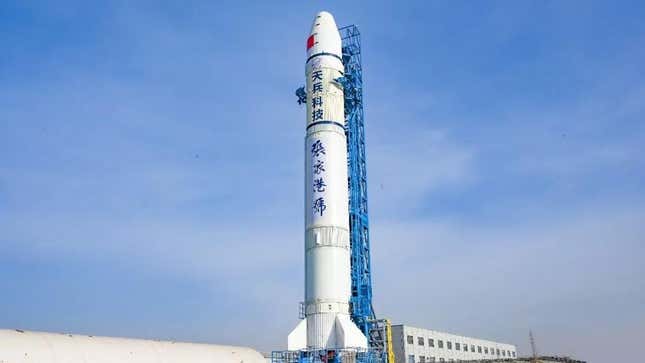
Chinese company Space Pioneer established a pair of milestones this past Sunday, becoming the first startup to successfully reach orbit on its first attempt, and the first Chinese company to reach orbit with liquid rocket propulsion.
Space Pioneer launched its Tianlong-2 from the Jiuquan launch centre in northwest China at 4:48 a.m. ET on April 2, according to SpaceNews. The rocket carried a small satellite to a Sun-synchronous orbit, where it will test its remote sensing capabilities.
Advertisement
The company, officially known as Beijing Tianbing Technology Co., is the first in China to fly a rocket using liquid propellant. Tianlong-2 uses liquid oxygen kerosene rather than solid propellant made from fuel and oxidizer, which allows for more control of the thrust magnitude and is better suited for reusability.
Last month, California-based company Relativity Space launched its own version of a liquid-propellant rocket. However, an engine failure prevented the 3D-printed Terran 1 rocket from reaching orbit, leaving Tianlong-2 to accomplish that feat.
G/O Media may get a commission

$32 off
The Hair Revitalizing Complex Full Set
Fight hair loss with science
Right now, you can get The Hair Revitalizing Complex Full Set for the price of the Refill. That’s just $98 for a 30-day supply, and $32 off the supplement’s normal price. This supplement is proven to deliver results. Augustinus Bader performed a six-month double blind trial that found those on the supplement had increased their hair count by 56%, hair shine by 100%, and saw a 98% reduction in hair damage compared to those who took a placebo.
Advertisement
Advertisement
Sunday’s launch is a testament to China’s growing private space industry, which began taking shape in 2014 when the Chinese government, choosing to relinquish its monopoly on the nation’s space sector, gave its commercial counterparts an opportunity to grow. Space Pioneer was founded in 2018 and the company has secured 3 billion yuan ($438 million) in funding since then.
The private space venture is getting ready for the launch of Tianlong-3, a larger liquid propellant rocket that’s designed with a reusable first stage similar to SpaceX’s Falcon Heavy rocket. The upcoming rocket will be capable of carrying 15 tons of payload to low Earth orbit, and it’s hoping to launch up to 60 satellites for China’s Guowang LEO communications megaconstellation, according to Space Pioneer. The company is targeting early 2024 for the first launch of Tianlong-3, while targeting around 12 launches per year starting 2025.
Advertisement
For more spaceflight in your life, follow us on Twitter and bookmark Gizmodo’s dedicated Spaceflight page.
Services Marketplace – Listings, Bookings & Reviews